Today marks the 95th anniversary of the treaty that created Vatican City.

At the time in 1929 this event was considered almost miraculous—to both Catholics and nonbelievers alike. The Lateran Treaty, as it is known, settled a long-standing and bitter grudge between the popes and the Kingdom of Italy. More on that later.
In 1929, Benito Mussolini had been in power for seven years. Italy was a constitutional monarchy under the House of Savoy. King Victor Emanuel III had appointed Mussolini Prime Minister in 1922. From that point on, Mussolini and his Fascist Party took greater control of the country. Few can deny that il Duce became a human dynamo, tackling every problem that plagued Italy. He secured huge loans from the United States to build more hydroelectric dams for energy poor Italy. By 1929, 80% of its electricity was generated by clean hydroelectric. (the U.S. was only at 30%). The 1920s saw the draining of much of Italy’s malarial marshland, reclaiming some 200 square miles of unused land for agriculture and for scores of new towns, reducing the curse of malaria, besides. The new agricultural land helped win what was called the ‘Battle for Wheat,’ begun in 1925 to make Italy self-sufficient in grain with 5,000 new farms. By 1929, Mussolini’s appointed Prefect for Sicily, Cesare Mori, had suppressed the Mafia to the point of extinction (but not quite!).
“You’re the Top; you’re Mussolini” as Cole Porter wrote in his original lyrics for a Broadway show. The Fascist dictator was truly at the top of his game, considered by world leaders and the media alike as a political genius. Could he match wits with Pope Pius XI?
The ‘Roman Question,’ as it was called, stemmed from Italy’s reunification (1860-1870). By 1870, the House of Savoy controlled all of Italy except the city of Rome, which was ruled by the Pope and defended by French troops. When France went to war with Prussia that year, French troops evacuated Rome and Italian troops moved in. The Pope considered himself a victim of Italian aggression, which had also taken the Church’s lands in central Italy (four regions known as the Papal States). In protest he ordered all Catholics not to collaborate with the new Italy. He and his successors confined themselves to an area called the Vatican and even refused to use St. Peter’s balcony to address the masses, lest they accidentally see ‘Savoy’ Rome in the distance. The popes hated the Savoys and vice versa. The Seat of Catholicism was no more, just a group of buildings without sovereignty. The popes didn’t travel beyond their miniscule domain, whether to other parts of Italy or beyond.
This situation hit home during the First World War (1915-1918) when the Italian government barred enemy diplomats from Germany and Austria-Hungary from visiting the Pope. Moreover, Catholics throughout Italy participated in the war effort contrary to the Pope’s wishes. Things were getting complicated.

Enter Mussolini. Undertaking secret negotiations, the Fascist government and Pope Pius XI’s representatives achieved an understanding known as the Lateran Accords. Formalized as a treaty between two sovereign states it was signed by Mussolini and the Pope’s secretary of state.
An interesting side note on the word ‘Lateran.’ It is the name of the oldest public church in the West, the Lateran Basilica, and the seat of the Bishop of Rome (i.e., the Pope). It was built on land owned by the Lateranus family of ancient Rome and taken by Emperor Constantine in A.D. 311 to build the church.
Back to the treaty. The Pope’s domain was recognized as a separate nation within an area to be named Vatican City. In return, the papacy recognized the Kingdom of Italy. Mussolini’s government agreed to pay the papacy something like $82 million for the regions it once possessed in central Italy. Further, the Kingdom adopted Roman Catholicism as the state religion, including restrictions on divorce and birth control.
In 1985, the treaty was amended. Catholicism was no longer the state religion, and Italy made its own laws regarding marriage and human rights. However, the Vatican still enjoys privileges such as a free water supply, tax exemptions for goods and services, access to Italian police resources, and Italian citizenship for former Vatican employees.
In this chapter of history, Mussolini was a blessing. -JLM

Mussolini was also the first head of state to speak via a new medium: film.
Click on the link to this Movie Tone Newsreel clip. Fascinating.
https://youtu.be/kAtAMs614Jk
President FDR also based social security after one of IL Duce’s government programs.
Mussolini was even named Man of the Year by TIME Magazine in 1932.
But oh, what a terrible ‘second half’ he had!
Very interesting story. Thank you